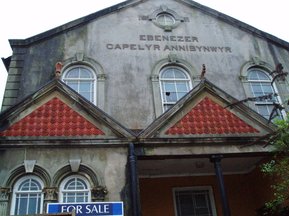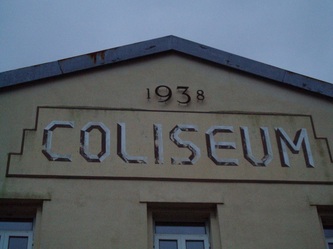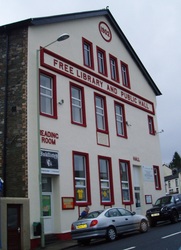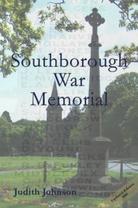 Ebenezer Chapel, Trecynon, Aberdare
Ebenezer Chapel, Trecynon, Aberdare After hearing many of the family stories over the years, it was affecting to see how nearby everything was. They could easily have walked from the house where my father-in-law was born and which became their family home after their marriage to visit friends and relatives in the streets nearby. Most of their needs were catered for within a very small area: shops, school, chapel, Free Library, and the Coliseum Theatre, where they took part in the amateur theatricals. The beautiful Aberdare park, where huge processions from the various chapels paraded at Whitsun, was also nearby. Opposite the house is a bus-stop, where, in years gone by, the miners would gather for the bus to the pit, and where they would sometimes sing while they were waiting. This was an integrated life, where people were sure of their place in their community, even though life was a struggle particularly through the years of the Great Depression and the World Wars.
It was upsetting to see Ebenezer Chapel, where the family had worshipped, up for sale, and derelict. The minister at my mother-in-law’s funeral, an Aberdare man himself, spoke of the moral force this Chapel had once had (formidable was the word he used), its influence in the town and marvellous choral singing. An erudite man, he had clearly used this adjective most particularly – the Oxford Dictionary of English defines formidable as inspiring fear or respect through being impressively large, powerful, intense, or capable. Seventeen years ago, when my father-in-law died, I recall the wonderful hymns sung at his funeral there – and the ‘hwyl’ (a Welsh word, roughly translated as soul/enthusiasm/spirit) with which the congregation sang in his honour. At the annual Cymanfa Ganus (hymn-singing festivals) once held here, the chapel was so full that extra chairs had to be set out in the aisles. In fact, the Cymanfa Ganu movement originated in Aberdare in 1859.
My mother-in-law’s grandfather, miner Richard Wigley, sang tenor in the celebrated South Wales Choral Union (‘Y Côr Mawr’) led by Griffith Rhys Jones (Caradog) of Aberdare, which won prizes in 1872 and 1873 at the Crystal Palace, London.
The religious revivals of the 19th century gave rise to the building of chapels, great and small, all over Wales. They undoubtedly had a binding and guiding influence on the people caught up in the furore of industrial development in South Wales, but today a great many of them are up for sale or closed. As GM Trevelyan, the historian said; “The dead were and are not. Their place knows them no more and is ours today... once, on this earth, once, on this familiar spot of ground, walked other men and women, as actual as we are today, thinking their own thoughts, swayed by their own passions, but now all gone, one generation vanishing into another, gone as utterly as we ourselves shall shortly be gone, like ghosts at cockcrow.”
My in-laws were proud of Aberdare. In its heyday it boasted many large fine and well-used buildings like the Ritz Cinema, the Temperance Hotel, and great Victorian Grammar schools. Today it has a sadly run-down aspect, though plans are afoot for urban regeneration. It has suffered the fate of so many towns where heavy industry and work have moved away. The
Little Theatre, opened in 1931 by the Trecynon Amateur Dramatic Society, is now a storage shed for window-frames, we heard.
But the people of Aberdare are as warm and friendly as ever. We had lunch at Servini’s Café in the town, where Mam and Dad may well have enjoyed an ice-cream when they were children. Afterwards we called in on a relative for several cups of tea and a long chat. Here’s
wishing the people of Aberdare a Happy New Year.



 RSS Feed
RSS Feed
